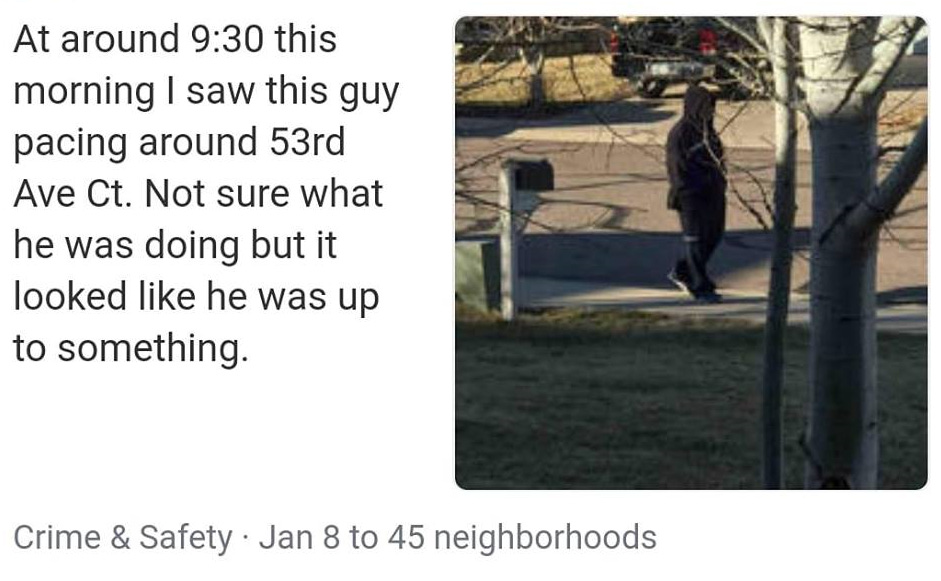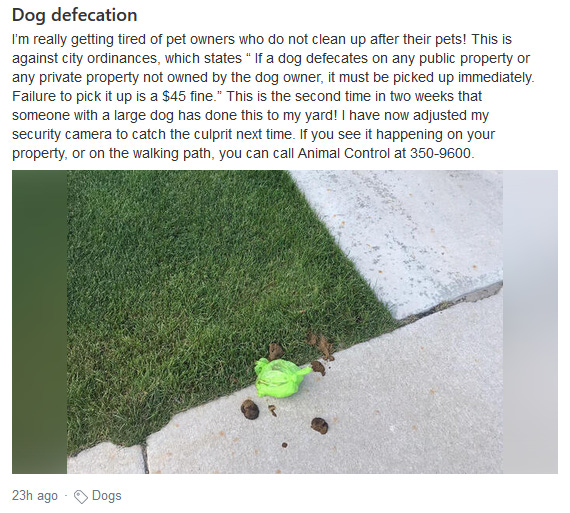With the Department of Justice and the FTC preparing to investigate Facebook and other tech giants over antitrust concerns, there's been more and more talk of the U.S. government potentially breaking up some of these companies to limit their power and societal influence. It's a complicated issue, and Facebook's public image certainly hasn't been helped in recent years with multiple news stories detailing the company's poor stewardship of user data.
Social media as a whole hasn't fared much better, with several high-profile examples of politically and ideologically selective censorship across the major services.
But one notable social-networking service seems to have largely escaped government scrutiny. And I think this should be of concern to people, considering that it is quite possibly the most disturbing and potentially hazardous platform of them all.
I'm talking about Nextdoor.
For those unfamiliar with Nextdoor, one could describe it as an online community bulletin board and neighborhood watch system, merged into a single offering.
When setting up an account on the Nextdoor website or app, users enter their residential address. Once they're logged in, they are connected with lots of people who live in their physical neighborhood (and nearby neighborhoods). When a user posts a message on Nextdoor, their neighbors (if they're also users) see it. It's a pretty straightforward concept.
Common types of posts include recommendation requests, reports of break-ins or vandalism, lost and found items, and used items for sale. There's also some occasional neighborhood gossip, but it's typically pretty harmless.
On paper, Nextdoor's a great idea. It often is in practice, as well.
For example, when a neighbor of mine first invited me to Nextdoor a few years ago, I curiously signed up, and right away spotted a brand new listing for a sleek-looking, smooth-operating 1970s turntable. I called the seller's phone number, drove less than a mile to his house, and picked it up for just 25 bucks. It was great!
By the way, those of you who follow me on Instagram have likely seen the old BIC in action:
But then... there's the dark side of Nextdoor — the side that makes you cringe at best, and at worst... fear for your life.
Okay, maybe not your life. That's an exaggeration. How about the welfare of your family and the stability of your environment? We'll go with that.
Anyway, there's an important difference between Nextdoor and the other social media platforms. With Facebook, your conversations are mostly between friends or people you've at least met. With Twitter, your discussions are mostly with far-away strangers you'll likely never meet. But with Nextdoor, you're dealing primarily with strangers who just happen to live mere minutes or even seconds from your home.
I'm talking about people who've probably seen you mow your lawn or unload groceries from your car, as they've driven by. I'm talking about people who've likely noticed you walking your dog, or who've watched your kids playing in your front yard.
So whenever something relatively insane pops up in your Nextdoor newsfeed, it's a bit unsettling to recognize that the person who posted it dwells within awfully close proximity.
Case in point, a few weeks ago, a woman on Nextdoor posted a safety alert not just to my neighborhood, but also to 60 surrounding neighborhoods. Her warning to all of us was that someone had knocked on her door the previous night.
If you're waiting to hear what happened next, you're probably going to be disappointed. You see, nothing happened, other than the knocker presumably leaving. That was her entire story, at least in regard to the incident itself. What came next, however, was the theory she had as to who was behind it: the South Americans.
She explained that the border patrol was dropping South Americans off by the thousands in southern Arizona, and that they've been heading north up here to Colorado. I'm not sure why she believed that their next logical step, upon arriving, would be to wait until sunset and then knock on her door, but the premise apparently warranted a massive community alert.
Sure, laugh if you want, but this is serious... and personal. You see, I occasionally knock on people's doors after the sun goes down, whether it be to return a borrowed item or to tell a neighbor that their dog has gotten loose. And I don't want to have to worry about ICE hauling me off to a detention center for questioning every time it happens. I just don't think that's a good use of taxpayers' money.
Where is Congress on this? Shouldn't they be adding this type of thing to that "you can't yell fire in a crowded theater" law?
It's interesting what people on Nextdoor consider "suspicious activity." One of my neighbors posted the below message and accompanying photo back in January, after he believed he had witnessed something rather nefarious:
As you can see, only 45 neighborhoods were alerted this time, warned to be on the lookout for a guy appropriately dressed for the season, walking down a sidewalk in the middle of the day.
Again, this hits close to home (both literally and figuratively). You see, aside from the fact that I sometimes slip on a jacket and go for a walk, the odds are at least 50/50 that that's actually me in the photo. So I'm not only concerned about the legal ramifications, but also my own self-esteem. I mean, do I just naturally look like I'm "up to something?" And if so, what does it look like I'm up to?
Is it my posture that's causing the problem? The spare tire?
The potential psychological damage that could come from instances like this is chilling to think about. The government needs to step in. I don't know if this is a cyber-bullying issue or what, but it's time for our political leaders to intervene.
Then there's the Nextdoor T.M.I. crowd, who, when voicing some gripe about the neighborhood, tends to include a little too much information. Here's a post from just yesterday:
Okay. Now, let me assure you all that I'm every bit as sensitive to the issue of hit-and-run dog defecation as the next guy. I'm sure it's a symptom of cultural degradation or something of that nature, but I just don't feel as though a visual aid is required to discuss the problem.
Am I wrong?
I find it particularly troubling that my neighbor chose to go this route, especially when there's a perfectly acceptable and even cute poop emoji (it has a face and everything) that just as easily could have been used in its place. In fact, this neighbor's decision to post this raw, no-holds-barred image is even more abhorrent to me than the negligence of the inconsiderate dog owner who allowed for this entire series of events to be put in motion.
And yes, I do realize that I have now amplified the problem by re-posting the photo here, but it's only because I care about providing you folks with the most detailed analysis possible. And for that, you're welcome.
But let's get back to the larger issue: Why is the U.S. government wasting its time on Facebook, Google, Amazon, and Apple, when Nextdoor is free to cause problems of this magnitude? Where are the regulators? Where is the Special Counsel? Heck, where is the public outrage?
We need laws, folks. We need government to protect us. We need...
Oh, wait a minute... So, it has just come to my attention that participation in social media is a voluntary venture, and that I can just delete my account if I don't like what's happening on Nextdoor and all of the other sites.
So, uh... forget all of the stuff I wrote above. Okay?
---
Did you miss John Daly's recent trip to the White House? Watch exclusively video of the special event below. Then learn more about his upcoming novel, Safeguard, here.






